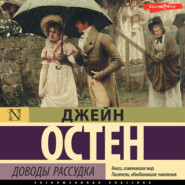По всем вопросам обращайтесь на: info@litportal.ru
(©) 2003-2024.
✖
Sense and Sensibility / Чувство и чувствительность. Уровень 3
Настройки чтения
Размер шрифта
Высота строк
Поля
“Do not blame him, however.”
“It may be proper to conceal their engagement (if they are engaged) from Mrs. Smith – and if that is the case, it is wise for Willoughby to leave Devonshire at the moment. But this is no excuse for their concealing it from us.”
“Concealing it from us! My dear child, do you accuse Willoughby and Marianne of concealment? This is strange indeed.”
“I want no proof of their affection,” said Elinor; “but of their engagement I do.”
“Actions speak plainly. Has not his behaviour to Marianne and to all of us, for at least the last fortnight, declared that he loved and considered her as his future wife? Have we not perfectly understood each other? My Elinor, is it possible to doubt their engagement? How could such a thought occur to you? Do you suppose him really indifferent to her?”
“No, I cannot think that. He must and does love her I am sure.”
“But with a strange kind of tenderness, if he can leave her with such indifference, such carelessness of the future, as you attribute to him.”
“You must remember, my dear mother, that I have never considered this matter as certain. I have had my doubts.”
“If you see them at the altar, you will suppose they are going to be married. Ungracious girl! But I require no such proof. You cannot doubt your sister’s wishes. It must be Willoughby therefore whom you suspect. But why? Is he not a man of honour and feeling? Can he be deceitful?”
“I hope not, I believe not,” cried Elinor. “I love Willoughby, sincerely love him; and suspicion of his integrity cannot be more painful to yourself than to me. It was involuntary, and I will not encourage it.”
“You speak very properly. Willoughby certainly does not deserve to be suspected. Though we have not known him long, he is no stranger in this part of the world. Who has ever spoken to his disadvantage?”
They were interrupted by the entrance of Margaret. They did not see Marianne till dinner time, when she entered the room and took her place at the table without a word. Her eyes were red and swollen. She avoided the looks of them all, she did not eat, and after some time, she burst into tears and left the room.
Chapter XVI
Marianne was awake the whole night, and she wept a lot. She got up with a headache, and was unable to talk.
When breakfast was over she walked out by herself, and wandered about the village of Allenham. Then she spent hours at the pianoforte alternately singing and crying. No letter from Willoughby came. Marianne’s mother was surprised, and Elinor again became uneasy. But Mrs. Dashwood found explanations whenever she wanted them,
“Remember, Elinor,” said she, “how very often Sir John fetches our letters himself from the post, and carries them to it. We have already agreed that secrecy may be necessary.”
“Why do you not ask Marianne at once,” said Elinor, “whether she is or she is not engaged to Willoughby?”
“I will not ask such a question. If they are not engaged, such an enquiry will inflict distress! At any rate it will be most ungenerous. I know Marianne’s heart: I know that she dearly loves me, and that is enough.”
It was several days before Willoughby’s name was mentioned before Marianne. Sir John and Mrs. Jennings, indeed, were not very nice; their witticisms added pain to many painful hours. One morning, Marianne joined her sisters in their usual walk, instead of wandering away by herself. Elinor and Marianne walked along the road through the valley, chiefly in silence. Beyond the entrance of the valley, they stopped to look around them, and examine a prospect which formed the distance of their view from the cottage.
Amongst the objects, they soon discovered a man on horseback riding towards them. In a few minutes Marianne rapturously exclaimed,
“It is he; it is indeed! I know it is!” and was hastening to meet him, when Elinor cried out,
“Indeed, Marianne, I think you are mistaken. It is not Willoughby. The person is not tall enough.”
“It is he,” cried Marianne, “I am sure he has. His coat, his horse. I know that!”
They walked and were soon within thirty yards of the gentleman. Marianne looked again, and welcomed Edward Ferrars.
He dismounted, and giving his horse to his servant, walked back with them to Barton.
He was welcomed by them all with great cordiality, but especially by Marianne, who showed more warmth than even Elinor herself. After a short silence which succeeded the first surprise and enquiries of meeting, Marianne asked Edward if he came directly from London. No, he had been in Devonshire a fortnight.
“A fortnight!” she repeated, surprised.
He looked rather distressed as he added, that he was staying with some friends near Plymouth.
Elinor talked of their present residence, its conveniences and so on. His coldness and reserve mortified her severely; she was vexed and half angry.
Chapter XVII
Mrs. Dashwood was surprised only for a moment. Edward’s arrival was, in her opinion, of all things the most natural.
“What are Mrs. Ferrars’s views for you at present, Edward?” said she, when dinner was over; “are you still going to be a great orator?”
“No. I hope my mother is now convinced that I have no talents for a public life!”
“But how will your fame be established? How will you become famous? You may find it a difficult matter.”
“I shall not attempt it. I have no wish to be distinguished; and have every reason to hope I never shall. Thank Heaven!”
“You have no ambition, I know. Your wishes are all moderate.”
“As moderate as those of the rest of the world, I believe. I wish as well as everybody else to be happy; but, like everybody else it must be in my own way. Greatness will not make me so.”
“Yes!” cried Marianne. “What have wealth or grandeur to do with happiness?”
“Grandeur has nothing,” said Elinor, “but wealth has much to do with it.”
“Elinor!” said Marianne, “money can only give happiness where there is nothing else to give it.”
“Marianne has no shyness at all,” said Elinor.
“Shyness is only the effect of a sense of inferiority,” replied Edward.
“And you are reserved,” said Marianne, “and that is worse.”
“Reserved! Am I reserved, Marianne?” Edward asked.
“Yes, very.”
“I do not understand you,” replied he. “Reserved! How, in what manner? What must I tell you? What can you suppose?”
Elinor looked surprised at his emotion; but trying to laugh, she said to him,
“Do not you know my sister well enough to understand what she means? Do not you know she calls everyone reserved who does not talk as fast, and admire what she admires as rapturously as herself?”
Edward made no answer. His gravity and thoughtfulness returned on him, and he sat for some time silent and dull.
Chapter XVIII
“It may be proper to conceal their engagement (if they are engaged) from Mrs. Smith – and if that is the case, it is wise for Willoughby to leave Devonshire at the moment. But this is no excuse for their concealing it from us.”
“Concealing it from us! My dear child, do you accuse Willoughby and Marianne of concealment? This is strange indeed.”
“I want no proof of their affection,” said Elinor; “but of their engagement I do.”
“Actions speak plainly. Has not his behaviour to Marianne and to all of us, for at least the last fortnight, declared that he loved and considered her as his future wife? Have we not perfectly understood each other? My Elinor, is it possible to doubt their engagement? How could such a thought occur to you? Do you suppose him really indifferent to her?”
“No, I cannot think that. He must and does love her I am sure.”
“But with a strange kind of tenderness, if he can leave her with such indifference, such carelessness of the future, as you attribute to him.”
“You must remember, my dear mother, that I have never considered this matter as certain. I have had my doubts.”
“If you see them at the altar, you will suppose they are going to be married. Ungracious girl! But I require no such proof. You cannot doubt your sister’s wishes. It must be Willoughby therefore whom you suspect. But why? Is he not a man of honour and feeling? Can he be deceitful?”
“I hope not, I believe not,” cried Elinor. “I love Willoughby, sincerely love him; and suspicion of his integrity cannot be more painful to yourself than to me. It was involuntary, and I will not encourage it.”
“You speak very properly. Willoughby certainly does not deserve to be suspected. Though we have not known him long, he is no stranger in this part of the world. Who has ever spoken to his disadvantage?”
They were interrupted by the entrance of Margaret. They did not see Marianne till dinner time, when she entered the room and took her place at the table without a word. Her eyes were red and swollen. She avoided the looks of them all, she did not eat, and after some time, she burst into tears and left the room.
Chapter XVI
Marianne was awake the whole night, and she wept a lot. She got up with a headache, and was unable to talk.
When breakfast was over she walked out by herself, and wandered about the village of Allenham. Then she spent hours at the pianoforte alternately singing and crying. No letter from Willoughby came. Marianne’s mother was surprised, and Elinor again became uneasy. But Mrs. Dashwood found explanations whenever she wanted them,
“Remember, Elinor,” said she, “how very often Sir John fetches our letters himself from the post, and carries them to it. We have already agreed that secrecy may be necessary.”
“Why do you not ask Marianne at once,” said Elinor, “whether she is or she is not engaged to Willoughby?”
“I will not ask such a question. If they are not engaged, such an enquiry will inflict distress! At any rate it will be most ungenerous. I know Marianne’s heart: I know that she dearly loves me, and that is enough.”
It was several days before Willoughby’s name was mentioned before Marianne. Sir John and Mrs. Jennings, indeed, were not very nice; their witticisms added pain to many painful hours. One morning, Marianne joined her sisters in their usual walk, instead of wandering away by herself. Elinor and Marianne walked along the road through the valley, chiefly in silence. Beyond the entrance of the valley, they stopped to look around them, and examine a prospect which formed the distance of their view from the cottage.
Amongst the objects, they soon discovered a man on horseback riding towards them. In a few minutes Marianne rapturously exclaimed,
“It is he; it is indeed! I know it is!” and was hastening to meet him, when Elinor cried out,
“Indeed, Marianne, I think you are mistaken. It is not Willoughby. The person is not tall enough.”
“It is he,” cried Marianne, “I am sure he has. His coat, his horse. I know that!”
They walked and were soon within thirty yards of the gentleman. Marianne looked again, and welcomed Edward Ferrars.
He dismounted, and giving his horse to his servant, walked back with them to Barton.
He was welcomed by them all with great cordiality, but especially by Marianne, who showed more warmth than even Elinor herself. After a short silence which succeeded the first surprise and enquiries of meeting, Marianne asked Edward if he came directly from London. No, he had been in Devonshire a fortnight.
“A fortnight!” she repeated, surprised.
He looked rather distressed as he added, that he was staying with some friends near Plymouth.
Elinor talked of their present residence, its conveniences and so on. His coldness and reserve mortified her severely; she was vexed and half angry.
Chapter XVII
Mrs. Dashwood was surprised only for a moment. Edward’s arrival was, in her opinion, of all things the most natural.
“What are Mrs. Ferrars’s views for you at present, Edward?” said she, when dinner was over; “are you still going to be a great orator?”
“No. I hope my mother is now convinced that I have no talents for a public life!”
“But how will your fame be established? How will you become famous? You may find it a difficult matter.”
“I shall not attempt it. I have no wish to be distinguished; and have every reason to hope I never shall. Thank Heaven!”
“You have no ambition, I know. Your wishes are all moderate.”
“As moderate as those of the rest of the world, I believe. I wish as well as everybody else to be happy; but, like everybody else it must be in my own way. Greatness will not make me so.”
“Yes!” cried Marianne. “What have wealth or grandeur to do with happiness?”
“Grandeur has nothing,” said Elinor, “but wealth has much to do with it.”
“Elinor!” said Marianne, “money can only give happiness where there is nothing else to give it.”
“Marianne has no shyness at all,” said Elinor.
“Shyness is only the effect of a sense of inferiority,” replied Edward.
“And you are reserved,” said Marianne, “and that is worse.”
“Reserved! Am I reserved, Marianne?” Edward asked.
“Yes, very.”
“I do not understand you,” replied he. “Reserved! How, in what manner? What must I tell you? What can you suppose?”
Elinor looked surprised at his emotion; but trying to laugh, she said to him,
“Do not you know my sister well enough to understand what she means? Do not you know she calls everyone reserved who does not talk as fast, and admire what she admires as rapturously as herself?”
Edward made no answer. His gravity and thoughtfulness returned on him, and he sat for some time silent and dull.
Chapter XVIII

















